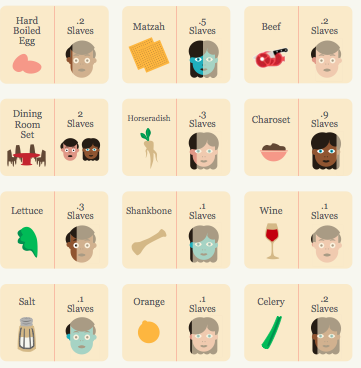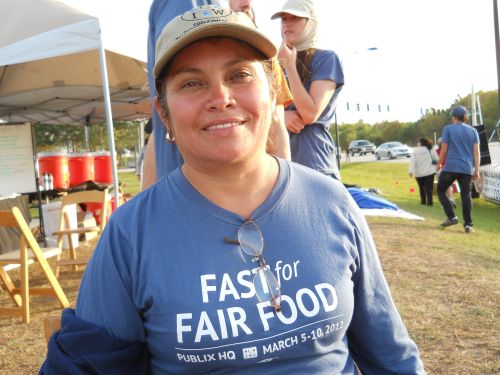By Gerardo Reyes-Chavez, Immokalee
Posted August 28, 2011 at 6 a.m.Thanks for the great question about what the Coalition of Immokalee Workers does for the migrant worker community besides the campaign for Publix to pay an extra penny per pound of tomatoes.
Thank you very much for giving us the opportunity to share a little more deeply with the Naples community about the changes we are working hard to bring to farmworkers and their families throughout Florida.
I’ll begin by outlining quickly some of the things we do outside of the Fair Food Program, and then will explain further how the Fair Food Program itself goes well beyond the penny-per-pound to bring about truly unprecedented changes in the fields.
We have many community-building programs with which you may not be familiar. We run a small store that helps families save money by providing staple foods and household products at a significant discount from retail prices. We run a low-power community radio station that provides the community with news, information and cultural enrichment, including programming you won’t find anywhere else, like indigenous language programs run by community members themselves. During events like hurricanes our station provides a unique service to the farmworker community by broadcasting and communicating essential information to a frequently underserved population.
We have a women’s group that learns basic English together, empowers women as community leaders, and works to end sexual harassment, which is all too prevalent in the fields. We also house a media center where members of the community can use computers and access the internet.
We help people when their loved ones pass away here in the U.S., far from their families; we work with the local police on crimes and community education; we help people with wage complaints in or out of the fields. Our members even collected food and clothing for the victims of the earthquake in Haiti.
These are just a few examples of the work we are doing with farmworkers and their families here in Immokalee and across the state.
Furthermore, we are working night and day to eliminate modern-day slavery from today’s agricultural industry. As I am sure you are aware, the CIW is recognized as a national and international leader in the work against human trafficking. We have worked directly with the U.S. Department of Justice and local law enforcement (including the Collier County Sheriff’s Office) on seven agricultural slavery prosecutions — and we continue to be involved in a number of ongoing investigations. At the same time, we train social-services and law-enforcement personnel on the recognition of and response to trafficking cases in their own communities, and serve as a resource for organizations and agencies as they encounter and serve ex-captives. In recognition of our groundbreaking work against human trafficking, Secretary of State Hillary Clinton recently recognized Laura Germino, the CIW’s anti-slavery coordinator, with a Trafficking in Persons (TIP) Hero Award, the first time that award has gone to a U.S.-based organization or individual.
In addition to our efforts to free workers from modern-day slavery through investigations and trainings, we are working to eliminate slavery and to prevent it from occurring in the first place through the Campaign for Fair Food.
The Campaign for Fair Food itself goes beyond the penny-per-pound request by calling on retailers to institute a strict code of conduct for their tomato purchases that requires tomato producers to participate in the Fair Food Program, providing their workers with, among other things, access to shade, a right to report abuse without fearing retaliation, and zero tolerance for the worst abuses.
The list of real, concrete changes brought about through the Fair Food Program is long, including:
n A worker-to-worker education process — on the farm and on the clock — by which workers learn of their new rights and responsibilities under the Fair Food code.
n A participatory complaint investigation and resolution process, or grievance system, through which workers are able to identify abusive bosses and workplace conditions and eliminate them, without fear of retaliation.
n The elimination of “cupping,” or the forced overfilling of buckets, until now a standard practice in the industry that can reduce a worker’s piece rate wages by as much as 10 percent.
n The institution of worker health and safety committees designed to create a space for discussion of workers concerns ranging from pesticide poisoning to sexual harassment.
n The provision of shade to prevent heat-related illnesses and time clocks so that workers are paid for all the hours they are on the job.
These structural changes in the tomato industry have already led to quality of life improvements for famworker families in Immokalee over the last season. For example, when workers are able to report for work when work actually begins they have more time to spend with their families. One worker reported that since the implementation of the Fair Food Program on the farm where he works, for the first time ever, he was able to eat breakfast and walk with his 10-year-old son to school in the morning. This is just one example of the impacts on the lives of farmworker families that we’ve been working toward for years and that the Campaign for Fair Food has helped to create, impacts that go well beyond the penny-per-pound.
I hope this gives you a more holistic understanding of our organization.
Gerardo Reyes-Chavez has worked in the fields since age 11 in Zacatecas, Mexico. He joined the Coalition of Immokalee Workers in 2000. Since then, the CIW says, Gerardo has been an active member of the CIW leading national actions in the CIW’s Campaign for Fair Food. He also helps to run Radio Conciencia, the CIW’s radio station.









 We’ve been hearing about Immokalee over the past few years because human rights organizations all across the country have been shedding light on horrifying cases where workers picking tomatoes have been victims of modern-day slavery. In November 2009, three farm workers locked inside a tomato delivery truck kicked open a ventilation hatch, escaped and brought public attention to the exploitation and abuse found in the Immokalee tomato fields. And this is just one of many such stories.
We’ve been hearing about Immokalee over the past few years because human rights organizations all across the country have been shedding light on horrifying cases where workers picking tomatoes have been victims of modern-day slavery. In November 2009, three farm workers locked inside a tomato delivery truck kicked open a ventilation hatch, escaped and brought public attention to the exploitation and abuse found in the Immokalee tomato fields. And this is just one of many such stories.










 2010 was a big year for tomatoes. The
2010 was a big year for tomatoes. The 









